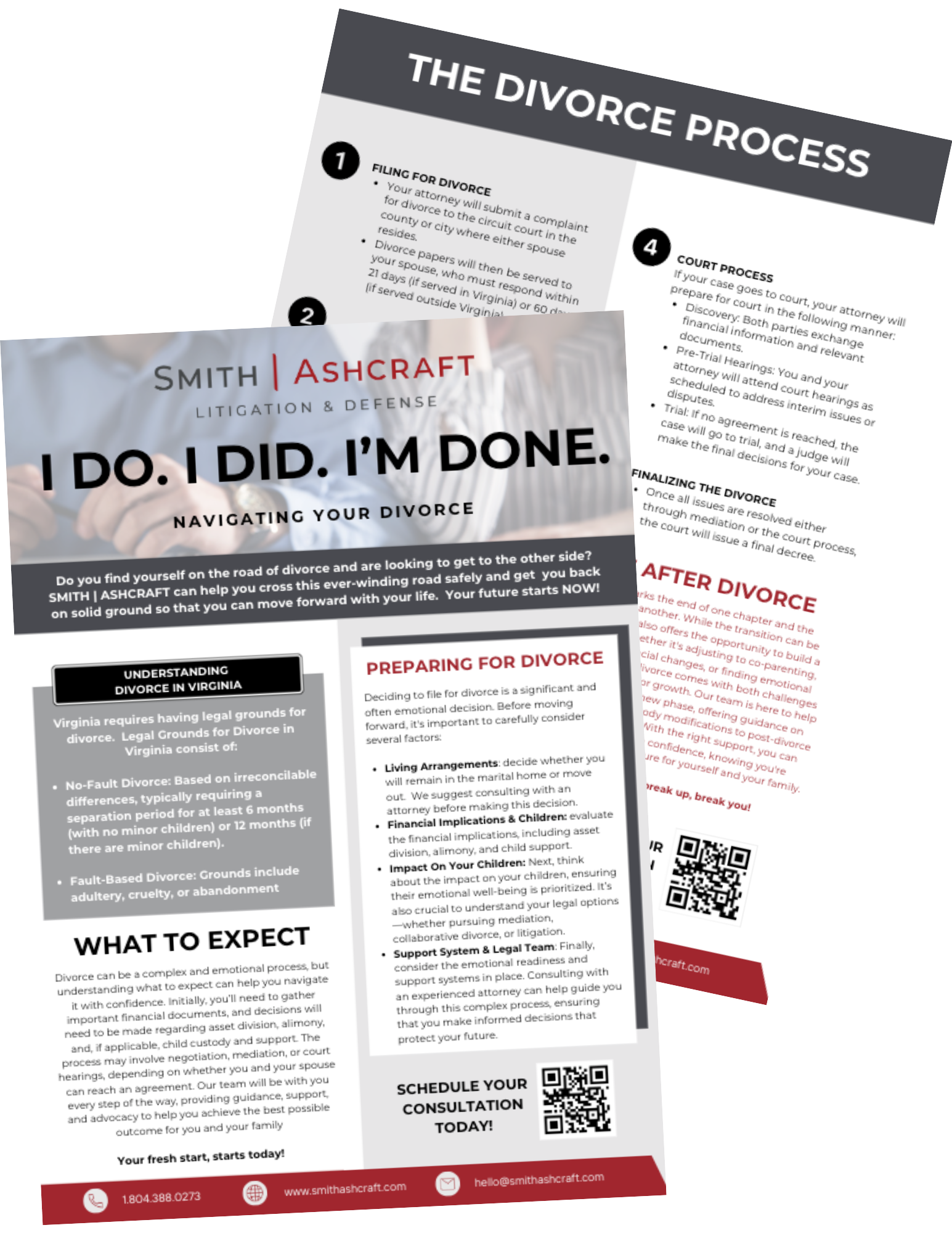Child Support
Understanding
Child Support
Child support is essential to ensuring that children’s financial needs are met after a divorce or separation. Whether you’re seeking support or being asked to provide it, understanding your rights and obligations is critical to reaching a fair outcome.
Virginia utilizes a specific set of guidelines and factors to determine child support obligations.
An overview of that process is below:
1. Child Support Guidelines
Virginia courts utilize a formula that focuses on the income of both parents and the number of children that requires support. These guidelines provide a basis for determining an appropriate and accurate amount of child support per Virginia and Federal standards.
2. Income Calculation
- Gross Income: The guidelines require gross income. This includes income from all sources: wages, bonuses, full time jobs, part time jobs, commissions, and all other sources of income, passive or not.
- Deductions: Certain deductions are allowed, such as health insurance premiums for the child, mandatory retirement contributions, and potentially other child support obligations.
3. Additional Factors
After the guidelines provide a proposed amount, the court may consider a multitude of other factors such as:
- Childcare Costs: Costs for childcare that assist with either parent’s ability to seek / partake in employment (full time or part time).
- Education Costs: Expenses stemming from a child's education (private or public depending on the facts of the matter).
- Extracurricular Activities: Costs stemming from a child’s activities.
- Special Needs: If a child has special needs, all the above will likely be considered in determining the child support obligation.
4. Modifications
- By Virginia law, child support can be modified (increased or decreased) by either parent if there is a significant change in circumstances, such as a change in income, employment status, or the child’s needs.
- The legal obligation does NOT change, unless the court drafts an order stating so, regardless of any out of court agreement that may be reached.
5. Duration of Support
- Unless otherwise ordered, Virginia support orders terminate child support on a child's 18th birthday; however, support continues for any child who is over the age of eighteen (18) and is a full time high school student until the child reaches age nineteen (19) or graduation from high school, whichever occurs first.
6. Enforcement
- If a parent fails to fulfill their child support obligation, the traditional course of action is to file a petition with the court informing the judge of their failure. This allows the court to utilize certain methods such as wage garnishments, tax refund interceptions, and even potential incarceration to attempt to ensure the obligation is fulfilled.
Tax Considerations
Parents who pay or receive child support payments need to be aware of how such payments impact their taxes in Virginia. Understanding such implications often plays a role in divorce, custody / visitation, and support negotiations. Below are key tax implications to consider related to custody and visitation matters:
1. Child Support
- Taxes: A common question we are asked is if a client must claim the child support payments they receive on their taxes as income. The answer is a resounding no. Child support payments are not deemed to be income for tax purposes. Another question we are asked is if a client can deduct child support payments they are making against their income. The answer is no once again. In short; Child support received is not income and child support paid is not deductible.
- Calculation: Unless the parties agree on a number as part of a settlement, the court will utilize the Virginia Child Support Guidelines to determine child support obligations. These guidelines consider factors such as the number of children, the parents’ incomes, if either parent is receiving or paying other child support obligations, and the costs typically associated with the raising of children.
2. Dependents and Tax Deductions
- Claiming Dependents: One parent may claim the child as a dependent on their taxes each year. Typically this ability is given to the parent with whom the child spends the most time with each year. This can play a large role in negotiating custody / visitation issues.
- Child Tax Credit: The parent who claims the child as a dependent is often also eligible for the child tax credit. This credit often reduces tax liability by a sizable margin.
Guardian ad Litem
A Guardian ad Litem (GAL) in Virginia is an attorney appointed by the court to represent the best interests of a child in legal proceedings, particularly in cases involving custody, visitation, abuse, neglect, or divorce.
Does a Guardian ad Litem (GAL) cost money?
- A GAL’s fee can vary from case to case. Often, the court will order both parents to pay the fees of a GAL based on the percentage split of the total income between the two parties to ensure that the lower earning party is not being disproportionately charged.
Arrears / Credits
The effective date of child support depends on whether you are filing for child support for the first time or whether you are trying to modify an existing order. When seeking an initial determination of child support, the effective date is the day in which the paying party is served with the Petition for Child Support. The effective date in a modification of an existing order of child support is the date that the Motion to Amend Child Support is filed.
The effective date is the furthest back in time that a judge can order child support. Since there are often months that pass from the filing of a child support action to the entry of a child support order, there is a likelihood that there will be an underpayment (arrears) or overpayment (credit) of child support during that time period. To account for that, a court will either increase or decrease the monthly amount of child support for a short time to even out what was or wasn’t paid. If there are arrears owed, they will be subject to statutory interest of 6% annually.
DCSE
The Division of Child Support Enforcement (DCSE) can be used in child support cases. If the parties don’t agree for support to be paid directly from one parent to another, DCSE can act as the collector of child support. If requested by either party, DCSE can garnish a paycheck to collect child support. If DCSE is involved in one’s case and they fall behind in child support payments, DCSE will assess arrears and potentially bring the delinquent payor to court to address the arrears. DCSE is also empowered to take up to 65% of your net paycheck and apply it to back child support. DCSE can also intercept any tax refund that one would otherwise be entitled to receive. If DCSE is involved in your case it is imperative to reach out to an attorney to help you work with them.
At SMITH | ASHCRAFT, we’re here to help you navigate the child support process, from calculating payments based on Virginia guidelines to modifying existing orders when circumstances change. Our goal is to protect your child’s well-being while advocating for a solution that works for your family.
Everything You Need to Understand to
Better Navigate Child Custody and Support
At SMITH | ASHCRAFT we are here to get you through this chapter of your life.
Your future starts NOW!
Custody and Visitation
Whether you are seeking sole custody, joint custody, or need help modifying an existing arrangement, we will advocate for a solution that supports your family’s unique needs.
Adoption
Adoption in Virginia is a legal process that involves several steps to ensure that the adoption is finalized and that the best interests of the child are met.
Learn more about the different types of adoption and how adoption can benefit for your family.
Grandparent and Third Party Rights
Virginia doesn’t specifically address statutory “grandparent rights.” Virginia does allow for “persons with legitimate interests” to file petitions for custody (decision-making power) and visitation (actual time with a child).
Learn more about third-party petitions and if it makes sense for your situation.
Child Name Change
There are situations in which a parent desires to change the name of their child.
Understand the process of a child's name change and how we can help.
Helpful Articles

What Our Clients Have To Say
Learn More About Child Custody and Support in Virginia
There's no where in Virginia that we don’t know
At SMITH | ASHCRAFT, we are proud to offer comprehensive legal services throughout Virginia. Whether you’re in Richmond, Northern Virginia, the far reaches of Roanoke, or any other part of the state, our experienced team is here to provide experienced representation tailored to your unique needs. No matter where you are in Virginia, we’re committed to delivering the same high level of service and dedication to each client, ensuring your case receives the attention it deserves.








